下册英语各单元知识点总结
- 格式:docx
- 大小:38.03 KB
- 文档页数:14
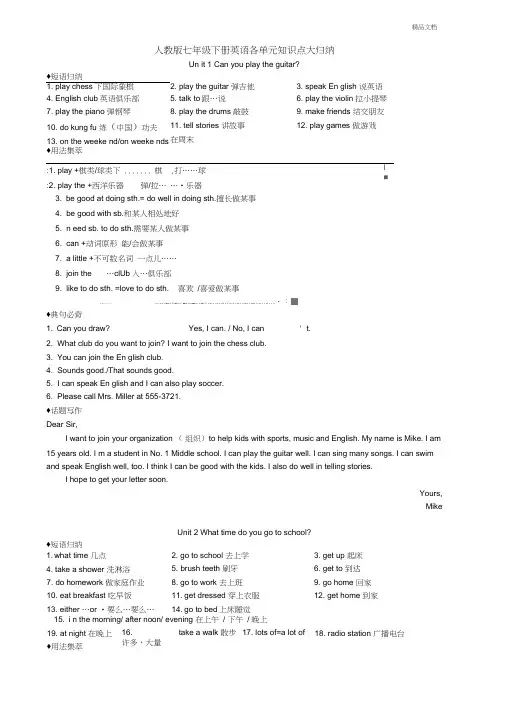
人教版七年级下册英语各单元知识点大归纳Un it 1 Can you play the guitar?♦短语归纳1. play chess 下国际象棋2. play the guitar 弹吉他3. speak En glish 说英语4. English club 英语俱乐部5. talk to 跟…说6. play the violin 拉小提琴7. play the piano 弹钢琴8. play the drums 敲鼓9. make friends 结交朋友 10. do kung fu 练(中国)功夫11. tell stories 讲故事12. play games 做游戏13. on the weeke nd/on weeke nds 在周末♦用法集萃:1. play +棋类/球类下 ....... 棋 ,打……球 I ■ :2. play the +西洋乐器弹/拉… …•乐器*3. be good at doing sth.= do well in doing sth.擅长做某事4. be good with sb.和某人相处地好5. n eed sb. to do sth.需要某人做某事6. can +动词原形 能/会做某事7. a little +不可数名词 一点儿……8. join the…clUb 入…俱乐部9. like to do sth. =love to do sth. 喜欢 /喜爱做某事:・・・— —DE —B n: & ■ ■ n tii ■< n IB L ■■ a ta b ■■ a ・・■■・・・a ・・IJII ・・it ・・・u ・・・n ・・・an ・・uai ・・a ・・・a ・・・u・:■♦典句必背1. Can you draw?Yes, I can. / No, I can' t.2. What club do you want to join? I want to join the chess club.3. You can join the En glish club.4. Sounds good./That sounds good.5. I can speak En glish and I can also play soccer.6. Please call Mrs. Miller at 555-3721.♦话题写作Dear Sir,I want to join your organization ( 组织)to help kids with sports, music and English. My name is Mike. I am 15 years old. I m a student in No. 1 Middle school. I can play the guitar well. I can sing many songs. I can swim and speak English well, too. I think I can be good with the kids. I also do well in telling stories.I hope to get your letter soon.Yours, MikeUnit 2 What time do you go to school?♦短语归纳15. i n the morning/ after noon/ evening 在上午 / 下午 / 晚上 16.take a walk 散步 17. lots of=a lot of 许多,大量1. what time 几点 4. take a shower 洗淋浴2. go to school 去上学 5. brush teeth 刷牙 7. do homework 做家庭作业 10. eat breakfast 吃早饭13. either …or •要么…要么… 8. go to work 去上班 11. get dressed 穿上衣服14. go to bed 上床睡觉 3. get up 起床 6. get to 到达 9. go home 回家 12. get home 到家19. at night 在晚上 ♦用法集萃18. radio station 广播电台20. be late for=arrive late for 迟至U:1. at +具体时间点在几点(几分) 2. eat breakfast/ lunch/dinner 吃早饭 /午饭 /晚饭 3. thirty\half past + 基数词 ... 点半 -4. fifteen\a quarter to + 基数词 差一刻到 ... 点 5. take a/an +名词 从事 .. 活动 6. from …to … 从 ... 到] . -7. need to do sth需要做某事1 —…•.亠 >.…一…U …J亠…亠十亠十亠十亠十——亠—―———L♦典句必背1. What time do you usually get up? I usually get up at six thirty.2. That ' s a funny time for breakfast.3. When do stude nts usually eat dinner?They usually eat dinner at a quarter to seve n in the eve ning.4. In the evenin g, I either watch TV or play computer games.5. At twelve, she eats lots of fruit and vegetables for lun ch..6. She knows it ' s not good for her, butsites good.7. Here are your clothes.♦话题写作主题:谈论日常作息习惯My School DayI am a stude nt. I usually get up at seve n, and I eat breakfast at seve n thirty. Then I go to school ateight.School starts at eight thirty. I eat lunch at twelve. I go home at 17:00. I often eat dinner at 19:00 and the n playthe pia no. I do my homework at 20:00. At 22:00, I go to bed.Unit 3 How do you get to school?♦短语归纳♦用法集萃1. take …to …=go to … by …2. How do / does (sb ) get to …'3. How far is it from…to …4. It takes sb. some time to do sth.5. How long does it take to do sth.?6. It is + adj. + to do sth.7. Thanks for + n. / Ving♦典句必背1. How do you get to school? I ride my bike.2. How far is it from your home to school?1. get to school 到达学校 4. how far 多远7. take the bus 乘公共汽车10. think of 认为 2. take the subway 乘地铁 5. from home to school 从家至U 学校 8. by bike 骑自行车3. ride a bike 骑自行车 6. every day 每天 9. bus stop 公共汽车站 11. betwee n …and 在…和…之间 12. one 11-year-old boy 一个 11 岁的男孩 13. play with 和…玩14. come true 实现 15. have to 不得不乘…去… …是怎样到…的? 从…到…有多远? 做某事花费某人多长时间。
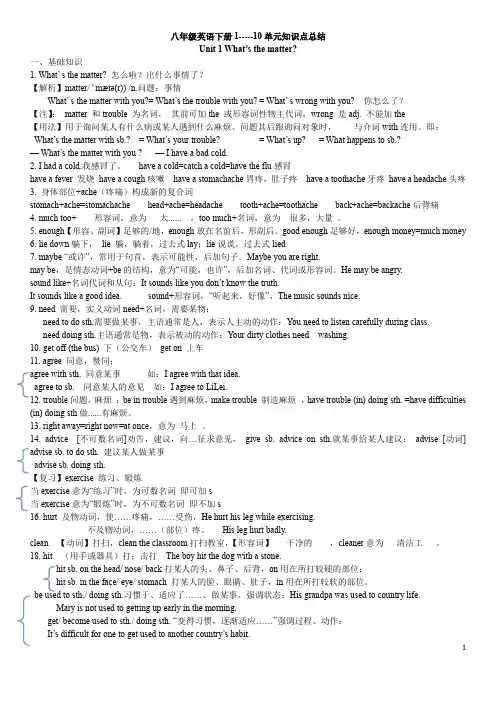
八年级英语下册1-----10单元知识点总结Unit 1 What’s the matter?一、基础知识1. What’ s the matter? 怎么啦?出什么事情了?【解析】matter/ ' mætə(r)) /n.问题;事情What’ s the matter with you?= What’s the trouble with you? = What’ s wrong with you? 你怎么了?【注】:matter 和trouble 为名词,其前可加the 或形容词性物主代词,wrong 是adj. 不能加the【用法】用于询问某人有什么病或某人遇到什么麻烦、问题其后跟询问对象时,与介词with连用。
即:What’s the matter with sb.? = What’s your trouble? = What’s up? = What happens to sb.?— What’s the matter with you ? — I have a bad cold.2. I had a cold.我感冒了。
have a cold=catch a cold=have the flu感冒have a fever 发烧have a cough咳嗽have a stomachache胃疼,肚子疼have a toothache牙疼have a headache头疼3. 身体部位+ache(疼痛)构成新的复合词stomach+ache=stomachache head+ache=headache tooth+ache=toothache back+ache=backache后背痛4. much too+ 形容词,意为太...... ,too much+名词,意为很多,大量。
5. enough【形容、副词】足够的/地,enough放在名前后,形副后。
good enough足够好,enough money=much money6. lie down躺下,lie 躺,躺着,过去式lay;lie说谎,过去式lied7. maybe “或许”,常用于句首,表示可能性,后加句子。
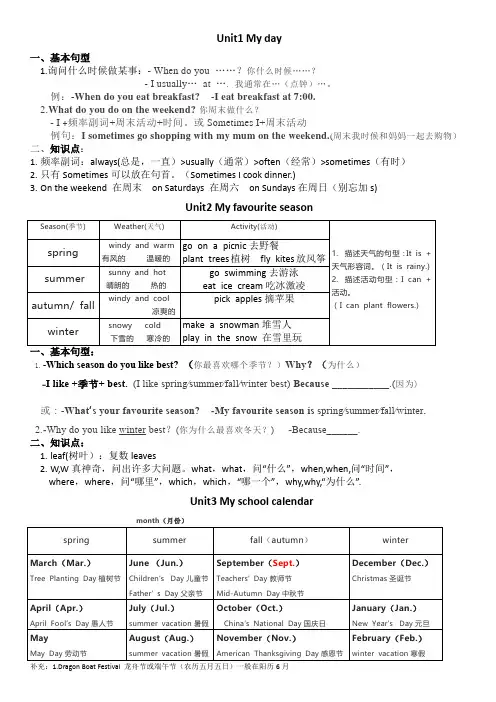
Unit1 My day一、基本句型1.询问什么时候做某事:- When do you ……?你什么时候……?- I usually…at …. 我通常在…(点钟)…。
例:-When do you eat breakfast?-I eat breakfast at 7:00.2.What do you do on the weekend?你周末做什么?- I +频率副词+周末活动+时间。
或Sometimes I+周末活动例句:I sometimes go shopping with my mum on the weekend.(周末我时候和妈妈一起去购物)二、知识点:1.频率副词:always(总是,一直)>usually(通常)>often(经常)>sometimes(有时)2.只有Sometimes可以放在句首。
(Sometimes I cook dinner.)3.On the weekend 在周末on Saturdays 在周六on Sundays在周日(别忘加s)Unit2 My favourite season1.-Which season do you like best? (你最喜欢哪个季节?)Why?(为什么)-I like +季节+ best.(I like spring∕summer∕fall∕winter best) Because ___________.(因为)或:-What‘s your favourite season? -My favourite season is spring∕summer∕fall∕winter.2.-Why do you like winter best?(你为什么最喜欢冬天?) -Because______.二、知识点:1.leaf(树叶):复数leaves2.W,W真神奇,问出许多大问题。
what,what,问“什么”,when,when,问“时间”,where,where,问“哪里”,which,which,“哪一个”,why,why,“为什么”.Unit3 My school calendar补充:1.Dragon Boat Festival 龙舟节或端午节(农历五月五日)一般在阳历6月2.月份首字母大写。
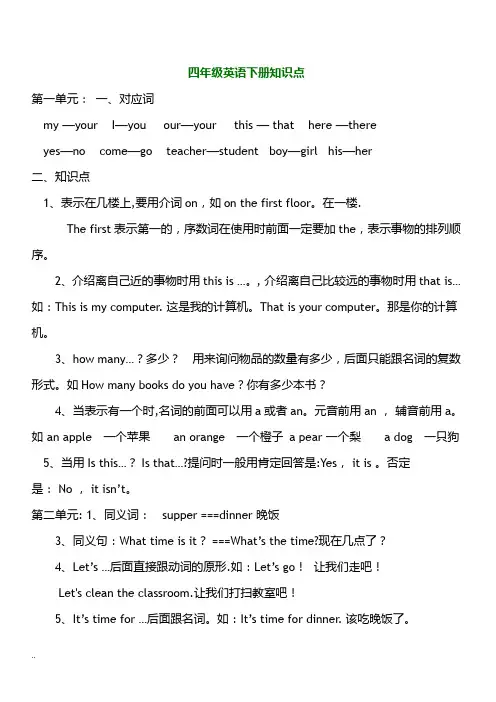
四年级英语下册知识点第一单元:一、对应词my —your I—you our—your this — that here —thereyes—no come—go teacher—student boy—girl his—her二、知识点1、表示在几楼上,要用介词on,如on the first floor。
在一楼.The first表示第一的,序数词在使用时前面一定要加the,表示事物的排列顺序。
2、介绍离自己近的事物时用this is …。
, 介绍离自己比较远的事物时用that is…如:This is my computer. 这是我的计算机。
That is your computer。
那是你的计算机。
3、how many…?多少?用来询问物品的数量有多少,后面只能跟名词的复数形式。
如How many books do you have?你有多少本书?4、当表示有一个时,名词的前面可以用a或者an。
元音前用an ,辅音前用a。
如 an apple一个苹果an orange一个橙子a pear 一个梨 a dog一只狗5、当用Is this…? Is that…?提问时一般用肯定回答是:Yes, it is 。
否定是: No , it isn’t。
第二单元: 1、同义词:supper ===dinner 晚饭3、同义句:What time is it?===What’s the time?现在几点了?4、Let’s…后面直接跟动词的原形.如:Let’s go!让我们走吧!Let's clean the classroom.让我们打扫教室吧!5、It’s time for …后面跟名词。
如:It’s time for dinner. 该吃晚饭了。
It's time for English class。
该上英语课了.It's time to…后面跟动词.如:It’s time to eat dinner。
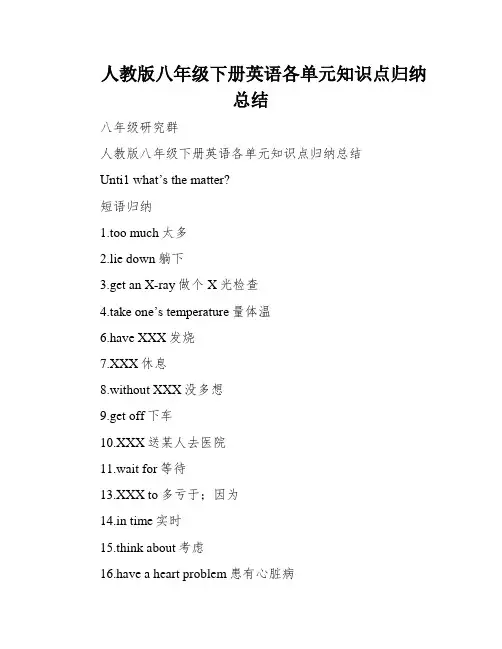
人教版八年级下册英语各单元知识点归纳总结八年级研究群人教版八年级下册英语各单元知识点归纳总结Unti1 what’s the matter?短语归纳1.too much太多2.lie down躺下3.get an X-ray做个X光检查4.take one’s temperature量体温6.have XXX发烧7.XXX休息8.without XXX没多想9.get off下车10.XXX送某人去医院11.wait for等待13.XXX to多亏于;因为14.in time实时15.think about考虑16.have a heart problem患有心脏病17.get into the trouble遇到麻烦18.do XXX做正确的事情事情19.fall down跌倒21.get hit/sunburned摔伤/烧伤23.be used to惯于....24.XXX挑战25.XXX落空生命26.because of因为27.run out of用完28.cut off切除29.get out of从...出来30.XXX做决意31.be in control of掌管;管理32.give up放弃用法归纳1.need to do sth .需要去做某事2.XXX看见某人正在做某事3.XXX询问某人某事4.4.XXX期望某人做某事5.agree to do XXX同意做某事6.help sb (to) do XXX匡助或人做某事7.want to do XXX想要做某事8.tell sb to do sth通知或人做某事9.have problems(in) XXX做某事有困难10.XXX用某物去做某事used to doing XXX惯于做某事12.seem to do XXX好像做某事13.keep XXX继续做某事14.XXX做某事语法点1.讯问或人的安康题目及碰到贫苦的表达办法2.情态动词should的用法3.不定代词的用法Unit 2 I’ll help to clean the city parks短语归纳1.clean up打扫干净2.cheer up(使)变得更高兴;振奋起来3.give out分发5.give away赠予;捐赠6.set up树立;设立7.make a difference有作为e up with想出9.put off推迟10.put up张贴11.call up打电话给13.care for照顾;照看14.give up放弃15.try out for参加选拔e true实现17.run out of用光19.fix up修理用法归结1.need to do sth需要做某事2.make plan to do sth制订打算做某事3.ask sb (not ) to do sth请求或人(不要)做某事ed to do sth曩昔经常做某事5.decide to do XXX决意做某事6.help sb (to)do XXX帮助某人做某事8.make it possible for sb to do sth使得做某事对或人来讲是可能的拓展链接动词+副词短语XXX up使高鼓起来clean up清扫洁净put up张贴mix up 修缮give away赠送give out分发give up放弃use up用光get up起床hand in上交put off推延pick up捡起think over细致思考turn down关小音量set up建立set off出发look out小心动词+介词短语hear of听说pay for支付wait for等待动词+副词+介词短语get out of制止come up with想出catch up with追上遇上look forward to等候渴望go on with继续动词+名词短语have a rest苏息一下take a walk漫步make XXX出错have a try试一下XXX发生tell a XXX撒谎make a decision做决定动词+名词+介词短语Be+形容词+介词短语XXX for迟到be angry with生气be fond of喜欢be good at 擅长动词不定式归纳只跟动词不定式做宾语的动词决心学会有希望(decide,learn,wish,hope)同意计划莫假装(agree,plan,pretend)忘记拒绝会失望(forget,refuse,fail)准备设法来帮忙(prepare,try,manage,help)提供请求负担起(offer,beg,afford)记得阻止理应当(remember stop,be supposed)题链接1.-Tom failed the exam again-Sorry to hear that. We should do XXX.A. XXXC.XXX2.XXX.A. XXXC. XXX cleaning3.XXX XXX.A. used to beB. is used to beC.was used to beD.is4.The old man lives,but he doesn’t feel .A. alone;XXX;lonelyC.lonely;aloneD. alone;lonely5.XXX, I have XXX tell6.--The old manall his money to a XXX.We all feel after hear of the news.A.excited;excitingB.exciting;excitingC.excited;excitingD.exciting;excitedUnit3 Could you please clean your room?短语归结1.do XXX洗餐具2.XXX out the XXX倒垃圾3.at least至少4.throw down扔下5.all the time一向;重复6.in surprise惊讶地10.provide XXX向某人提供某物11.depend on依赖;信赖12.look after照顾;照看13.take care of照顾14.as a result结果用法归结1.XXX XXX做完某事2.want sb to do XXX想要某人做某事3.try (not) to do sth尽力(不)做某事4.let sb do XXX让或人做某事6.XXX做某事7.learn to do sth研究做某事8.learn how to do sth研究怎样做某事语法点神态动词could的用法表示请求与准许,could委婉有礼貌;表示能力会不会,could只把过去表Unit 4 why don’t you talk to your parents?短语归结1.too much太多(修饰不可数名词)2.hang out闲逛3.too many太多(修饰可数名词复数)4.get into a fight争吵5.call sb up给某人打电话6.XXX谈论7.XXX浏览8.give back清偿9.be angry with sb生或人的气10.a big deal紧张的工作11.work out解决;算出12.get on with sb与某人和睦相处13.XXX与某人交流16.in front of在...前面17.not... any more不再...18.so much/many那末多pete with sb与某人竞争20.cut out删除;删去21.all kinds of各类百般23.XXX...看24.turn down调小用法归纳1.allow sb to do XXX允许某人做某事2.why don’t you do sth?为甚么不做某事呢?3.why not do sth ?为什么不做某事呢?4.find sb doing XXX发觉或人在做某事5.tell sb to do XXX告诉某人做某事6.refuse to do XXX回绝做某事7.let sb do XXX让或人做某事8.offer to do XXX主动提供做某事9.not....until....直到....才...10.it’s time to do sth该做某事了12.keep XXX连续做某事13.what do you think of...?你认为....怎么样?语法点came?短语归纳1.wait for等候2.look for寻觅3.go off (闹铃)发出声音4.XXX洗澡5.pick up接德律风;捡起6.make sure确信;务必7.have fun玩的开心8.fall asleep入眠;睡觉9.die down逐突变弱;逐步消逝10.wake up醒来;叫醒11.in a mess杂乱无章12.take photos照相13.turn on翻开14.in silence缄默沉静地;无声地15.XXX down摧毁;拆卸;记下16.tell XXX说实话17.point out指出18.go XXX消逝19.as well也用法归结1.XXX忙于(做)某事2.XXX看见某人或某物正在做某事3.begin/start to do sth开始做某事4.try to do XXX努力去做某事5.have trouble(in)doing sth做某事有艰巨语法点曩昔举行时过去进行最好记,was/were+doing特定时间有暗示,过去某刻某时段一定主语在句首,普通问句Be提早否定句式更简朴,Be后只把not添Unit 6 An old man tried to move the mountains短语归纳1.work on从事3.XXX...XXX拿走,带走4.a good way to do sth做某事的好办法5.a little bit一点儿6.once upon a time从前7.turn...into..变成8.XXX呈现,出版,结果是9.get married立室10.fall in love with sb爱上某人11.be born出生12.all over the world全球13.make a plan to do sth制订打算做某事14.along the way沿路15.be lost迷路16find out找出17.learn about了解用法归纳1.try to do sth设法做某事2.XXX XXX完成做某事3.continue to do XXX连续做某事4.make sb do XXX让某人做某事5.keep XXX一向做某事6.instead of XXX代替做某事7.be able to do能够做某事9.have no time to do sth没有工夫做某事10.XXX XXX对做某事感乐趣11.can’t stop doing XXX禁不住做某事12.XXX听到或人正在做某事13.XXX引导某人到某处14.XXX把某物遗忘在某地15.XXX向某人展示某物语法点1.unless引导的条件状语从句2.XXX...引导的结果状语从句3.as soon as指导的工夫状语从句Unit7 XXX?短语归纳1.take in吸入;吞入2.in the face of面临(题目;艰巨)3.XXX出身时4.as you can see正如你所看到的5.as far as I know据我所知6.up to直到7.prepare ...for...为...筹办...8.fall over摔倒10.cut down砍倒11.take care of照顾;照看12.or so大约;左右13.in XXX处于危险之中用法归纳4.what’s the+形容词最高级+名词in the world?世界上最....的....是什么?5.XXX..保护....使不受;防备6.XXX胜利做成某事8.send sb to do XXX派某人去做某事1.数词hundred,thousand,million,XXX的用法2.形容词和副词的比较级和最高级用法比较级变革划定规矩比较品级要变革,普通词尾加-er词尾如有哑音e,间接加r就能够一辅重读闭音节,辅音字母要双写辅音字母加y结尾,要把y改i加erUnit8 Have you read Treasure Island yet?短语归纳1.be full of充满2.grow up长大3.XXX up赶快4.XXX带回到某地5.more than超过6.in the middle of在....中央7.fight over为....争吵;争斗8. think about斟酌9.XXX XXX开始意识到10.ever since then从那时起11.a kind of一种12.such as比方13.XXX属于14.find out找出;查出15.at the end of the day在一天竣事的时候16.be famous for因为...而出名17. leave XXX遗忘;留下18.the importance of money and success金钱和成功的重要性用法归结1.XXX XXX完成做某事2.XXX抵达某地3.learn to do sth研究做某事4.XXX看到某人正在做某事6.XXX教或人某事e sth to do用某物做某事8.love to do/doing XXX喜欢做某事9.can’t wait to do sth迫不及待做某事10.be kind to sb对某人友好11.hope to do XXX希望做某事12.have time to do sth有时间做某事13have nothing to do没什么事情可做语法点目前完成时Unit9 Have you ever been to a museum?短语归纳1.have a great time玩的兴奋2.put up搭建;支起3.in such a rapid way用如此快速的方式4.be able to do XXX能够做某事5.a couple of少数;几个6. on the other hand另一方面7.three quarters四分之三8.whether...or...不论...照旧...9.wake up醒来10.all year round一年到头,长年11.close to靠近用法归纳1.a great way to do sth一个做某事的好办法2.watch sb to do sth观看或人做了某事4.XXX do XXX勉励或人做某事5. have problem (in)doing sth做某事很费力6.as...as..和...一样7.the best time to do sth做某事的最好工夫8.choose to do sth选择做某事9.tell sb to do XXX告诉某人做某事语法点现在完成时区分:have been to和have gone toUnit10 I’v had this bike for three years短语归纳1.h0w long多长,多长时间3.welcome to ...欢迎到....4.XXX察看5.at first起初6. no longer不再;不复7..as for ...至于....8..to XXX说实在的9.search for寻找11.according to依据;按照12.in one’XXX...看13.in order to为了用法归结3.have been in+地点在某处待了多久5.hope to do XXX希望做某事7.one of+the +描述词最初级+可数名词复数+V单数最....的...之一是....ed to do XXX过去常常做某事9.need to do sth需求做某事语法点目前完成时1.since和for指导状语的辨别2.延续性动词和瞬间动词瞬间动词转为为延续动词表borrow-XXX-havecatch a cold-have a coldput on-wearget to know-knowget to sleep-XXXgo out-XXX-be(in)die-be XXX-be overfall ill-be illjoin-be in/be a member offall XXX XXX响应的介词close-be close。
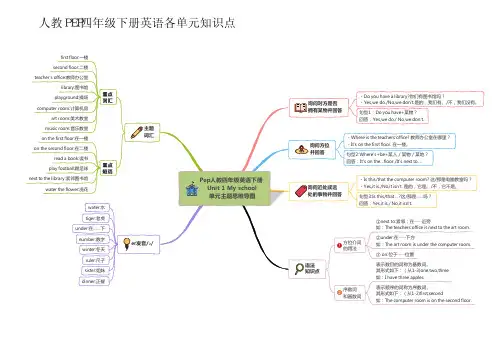
人教PEP四年级下册英语各单元知识点
Unit 1 My school
单元主题思维导图
方位介词
的用法
序数词
和基数词
Unit 2 What time is it? 单元主题思维导图
Unit 3 Weather 单元主题思维导图cold:意冷的:冷的cool:凉的:凉爽的warm:温暖的:暖和的hot:热的;烫的sunny:阳光充足的windy:多风的;风大的snowy:下雪(多)的rainy:阴雨的:多雨的
1.How about的用法
2.温度符号的用法
Unit 4 At the farm
名词变复数
this、that、
these、those的辨别
How many的用法
Unit 5 My clothes 单元主题导图
Unit 6 Shopping
单元主题导图
too的两种用法②加在形容词或副词前,too表示“太、过于”。
如:This dress is too expensive.
try on 意为:“试穿,试戴”,后跟衣服、鞋子、帽子等。
表示自己想要试穿衣物的时候可以说:
如:I want to try on that hat./I want to try that hat on.
注意:用代词代指物品时,代词放中间。
如:The dress is pretty.Can I try it on?
try on的用法。
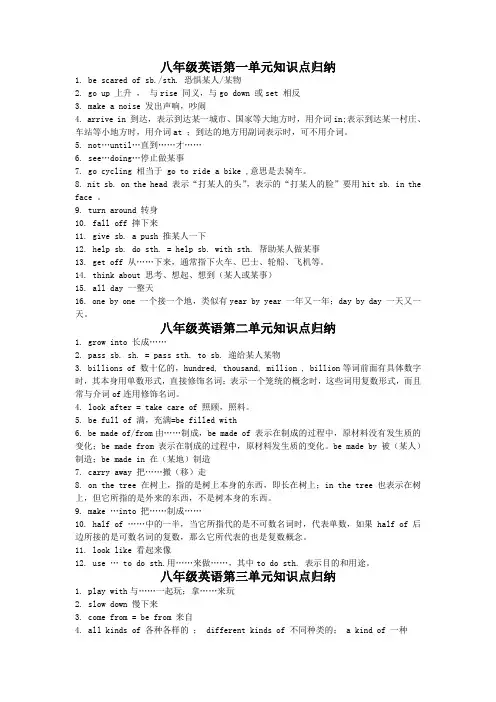
八年级英语第一单元知识点归纳1. be scared of sb./sth. 恐惧某人/某物2. go up 上升,与rise 同义,与go down 或set 相反3. make a noise 发出声响,吵闹4. arrive in 到达,表示到达某一城市、国家等大地方时,用介词in;表示到达某一村庄、车站等小地方时,用介词at ;到达的地方用副词表示时,可不用介词。
5. not…until…直到……才……6. see…doing…停止做某事7. go cycling 相当于 go to ride a bike ,意思是去骑车。
8. nit sb. on the head 表示“打某人的头”,表示的“打某人的脸”要用hit sb. in the face 。
9. turn around 转身10. fall off 摔下来11. give sb. a push 推某人一下12. help sb. do sth. = help sb. with sth. 帮助某人做某事13. get off 从……下来,通常指下火车、巴士、轮船、飞机等。
14. think about 思考、想起、想到(某人或某事)15. all day 一整天16. one by one 一个接一个地,类似有year by year 一年又一年;day by day 一天又一天。
八年级英语第二单元知识点归纳1. grow into 长成……2. pass sb. sh. = pass sth. to sb. 递给某人某物3. billions of 数十亿的,hundred, thousand, million , billion等词前面有具体数字时,其本身用单数形式,直接修饰名词;表示一个笼统的概念时,这些词用复数形式,而且常与介词of连用修饰名词。
4. look after = take care of 照顾,照料。
5. be full of 满,充满=be filled with6. be made of/from由……制成,be made of 表示在制成的过程中,原材料没有发生质的变化;be made from 表示在制成的过程中,原材料发生质的变化。
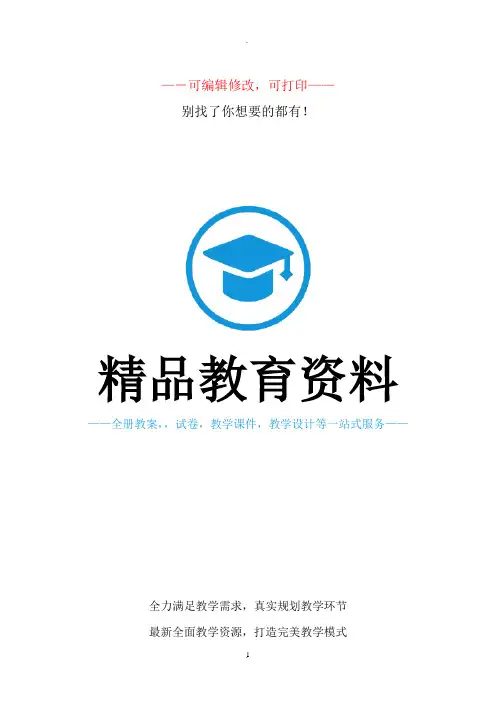
—-可编辑修改,可打印——别找了你想要的都有!精品教育资料——全册教案,,试卷,教学课件,教学设计等一站式服务——全力满足教学需求,真实规划教学环节最新全面教学资源,打造完美教学模式七年级上册Starter unit 11.短语归纳:good morning 早上好 good afternoon 下午好 good evening 晚上好name list 名单 an English name 英文名字2.必背典句:(1)Good morning! 早上好!(2)Good afternoon! 下午好!(3)Good evening 晚上好!3.英语中常见的问候语(1)Hello! “你好!”是比较随便、不分时间的一种问候语,通常用于打招呼、打电话。
表示惊讶或引起对方注意。
对方应答仍用Hello!(2)Hi! “你好!”的使用比hello!更随便,在年轻人中使用更为普遍。
(3)Nice to meet you! “很高兴见到你!”是两个初次见面、经介绍相识的人互相打招呼的用于。
回答时可以说Nice to meet you, too.或者Me, too.表示“见到你很高兴”(4)How do you do? “你好!”用于初次见面,是非正式的打招呼用语。
对方应答语应是“How do you do?”(5)How are you? 表示问候How are you? 意为“你好吗?”,为询问对方身体状况的问候语,应答语一般是“I’m fine. Thank you. / I’m very well. Thank you. / I’m OK.How are you? 的其他用法:习惯上回答完别人的问候后,常可反问对方的身体状况,此时可用How are you?也可用And you? “你呢?”4.大写字母的用法:(1) 在英语中,句子的第一个单词的第一个字母都应大写。
Sit down, please. 请坐。
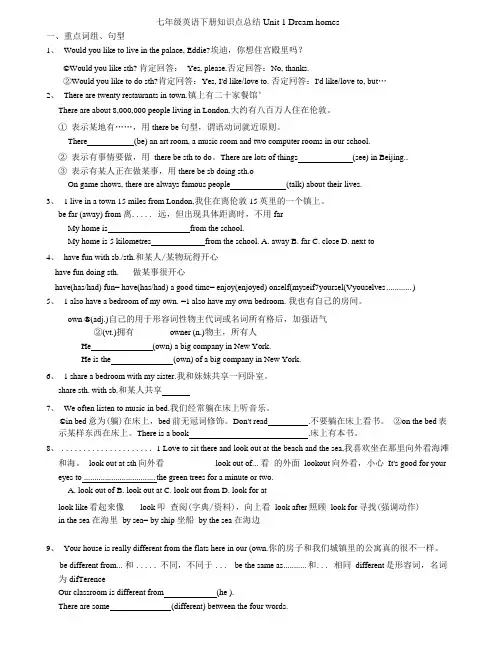
七年级英语下册知识点总结Unit 1 Dream homes一、重点词组、句型1、Would you like to live in the palace, Eddie?埃迪,你想住宫殿里吗?©Would you like sth? 肯定回答:Yes, please.否定回答:No, thanks.②Would you like to do sth?肯定冋答:Yes, I'd like/love to. 否定冋答:I'd like/love to, but…2、There are twenty restaurants in town.镇上有二十家餐馆°There are about 8,000,000 people living in London.大约有八百万人住在伦敦。
①表示某地有……,用there be句型,谓语动词就近原则。
There (be) an art room, a music room and two computer rooms in our school.②表示有事情要做,用there be sth to do。
There are lots of things (see) in Beijing..③表示有某人正在做某事,用there be sb doing sth.oOn game shows, there are always famous people (talk) about their lives.3、 1 live in a town 15 miles from London,我住在离伦敦15英里的一个镇上。
be far (away) from 离..... 远,但出现具体距离时,不用farMy home is from the school.My home is 5 kilometres from the school. A. away B. far C. close D. next to4、have fun with sb./sth.和某人/某物玩得开心have fun doing sth. 做某事很开心have(has/had) fun= have(has/had) a good timc= enjoy(enjoyed) onself(myseif7yoursel(Vyouselves ............ )5、 1 also have a bedroom of my own. =1 also have my own bedroom. 我也有自己的房间。
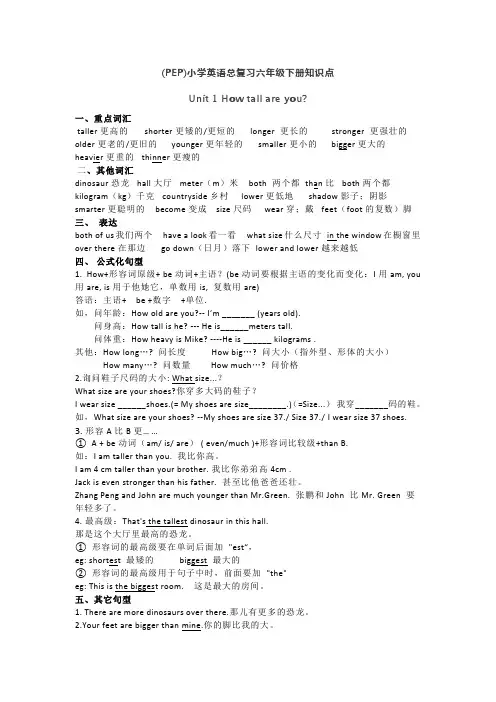
(PEP)小学英语总复习六年级下册知识点Unit 1 How tall are you?一、重点词汇taller更高的 shorter更矮的/更短的longer 更长的 stronger 更强壮的older更老的/更旧的 younger更年轻的smaller更小的 bigger 更大的heavier更重的thinner更瘦的二、其他词汇dinosaur恐龙hall大厅meter(m)米both 两个都than比both两个都kilogram(kg)千克countryside乡村lower更低地shadow影子;阴影smarter更聪明的become变成 size尺码wear 穿;戴feet(foot的复数)脚三、表达both of us我们两个have a look看一看what size什么尺寸in the window在橱窗里over there在那边go down(日月)落下lower and lower越来越低四、公式化句型1. How+形容词原级+ be动词+主语?(be动词要根据主语的变化而变化:I用am, you 用are, is用于他她它,单数用is, 复数用are)答语:主语+be +数字+单位.如,问年龄:How old are you?-- I’m _______ (years old).问身高:How tall is he? --- He is______meters tall.问体重:How heavy is Mike? ----He is ______ kilograms .其他:How long…? 问长度How big…? 问大小(指外型、形体的大小)How many…? 问数量How much…? 问价格2.询问鞋子尺码的大小: What size...?What size are your shoes?你穿多大码的鞋子?I wear size ______shoes.(= My shoes are size________.)(=Size...)我穿_______码的鞋。
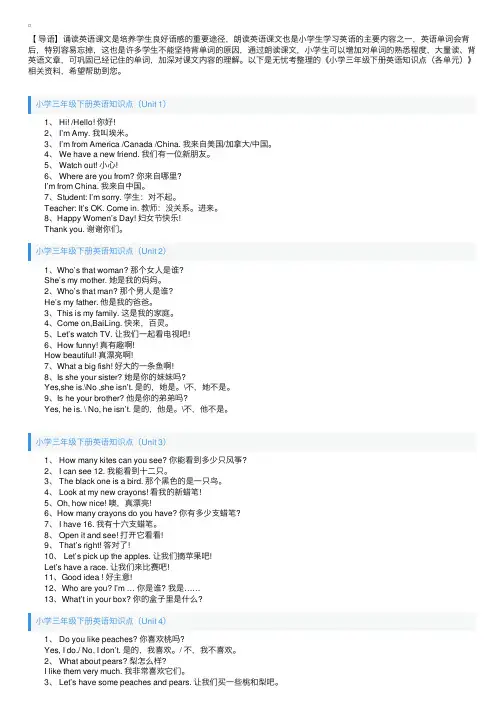
【导语】诵读英语课⽂是培养学⽣良好语感的重要途径,朗读英语课⽂也是⼩学⽣学习英语的主要内容之⼀,英语单词会背后,特别容易忘掉,这也是许多学⽣不能坚持背单词的原因,通过朗读课⽂,⼩学⽣可以增加对单词的熟悉程度,⼤量读、背英语⽂章,可巩固已经记住的单词,加深对课⽂内容的理解。
以下是⽆忧考整理的《⼩学三年级下册英语知识点(各单元)》相关资料,希望帮助到您。
⼩学三年级下册英语知识点(Unit 1) 1、 Hi! /Hello! 你好! 2、 I’m Amy. 我叫埃⽶。
3、 I’m from America /Canada /China. 我来⾃美国/加拿⼤/中国。
4、 We have a new friend. 我们有⼀位新朋友。
5、 Watch out! ⼩⼼! 6、 Where are you from? 你来⾃哪⾥? I’m from China. 我来⾃中国。
7、Student: I’m sorry. 学⽣:对不起。
Teacher: It’s OK. Come in. 教师:没关系。
进来。
8、Happy Women’s Day! 妇⼥节快乐! Thank you. 谢谢你们。
⼩学三年级下册英语知识点(Unit 2) 1、Who’s that woman? 那个⼥⼈是谁? She’s my mother. 她是我的妈妈。
2、Who’s that man? 那个男⼈是谁? He’s my father. 他是我的爸爸。
3、This is my family. 这是我的家庭。
4、Come on,BaiLing. 快来,百灵。
5、Let’s watch TV. 让我们⼀起看电视吧! 6、How funny! 真有趣啊! How beautiful! 真漂亮啊! 7、What a big fish! 好⼤的⼀条鱼啊! 8、Is she your sister? 她是你的妹妹吗? Yes,she is.\No ,she isn’t. 是的,她是。
Unit 1 The lion and the mouse 知识汇总一、四会单词rge大的2. strong强壮的3. quietly安静地;小声地4. Weak虚弱的5. loudly 大声地6. happily开心地;高兴地二、三会单词老鼠mouce 复数mice 走过,路过walk by 吵醒,叫醒,弄醒,醒醒wake …up其中一天same day 释放不能,放开let… go 第二天the next day 网net 咬bite 锋利的,尖的sharp难过地,伤心地sadly 就在那时just then 不久,很快soon 从那时起from then on 欢呼cheer 打,击hit 深的deep 够得着reach迅速地,快地quickly 把……倒入pour …into 三、短语积累狮子和老虎 the lion and the mouse mouse: 复数 mice 辨析 mouth嘴巴 month月份又大又强壮large and strong 又小又弱small and weak走过… walk by 走过森林walk by the forest把狮子叫醒 wake the lion up (代词宾格放中间) wake me up 我能在其中一天帮助你I can help you some day 将来不确定的其中一天Some day:安静地说say quietly quiet→quietly 大声地笑道laugh loudly loud→loudly 让狮子走let the mouse go let sb do 第二天the next day用一个大网抓住狮子catch the lion with a large net catch过去式:caught 用他的锋利的牙齿咬网 bite the net with his sharp teeth (tooth) bite过去式: bit 出来get out伤心地问道ask sadly sad→sadly 就在那个时候just then在网里弄了个大洞make a big hole in the net 开心地说say happily happy→happily 从那时起from then on他会说什么? what will he say? 没关系It doesn’t matter.伊索寓言Aesop’s Fables一本中文成语书a Chinese idiom book 开心地打乒乓play table tennis happily 擅长be good at+名词 // be good at +动词ing大声地为他们欢呼 cheer for them loudly cheer for为…欢呼击球用力hit the ball hard hit打,击 (过去式: hit): 最后finally 近意: at last 太深too deep我够不到I can’t reach it reach到达 reach my school 迅速地拿一些水来bring some water quickly 把它倒进洞里pour it in the hole 干得好! Well done!四、四会句子The mouce said quietly. 老鼠小声地说。
人教版初中英语八年级下册全册各单元知识点、语法归纳整理Unit1W hat’s the matter?一.重点短语归纳1.foot---feet脚tooth---teeth牙齿2.have a cold感冒3.have a stomachache胃疼4.have a sore back背疼5.have a sore throat喉咙疼6.have a fever发烧7.lie down and(have a)rest躺下休息have a rest休息8.hot tea with honey加蜜的热茶9.see a dentist看牙医see a doctor看医生10.drink lots of water多喝水11.lots of ,a lot of,许多。
大量a lota lot of=lots of,可以修饰可数名词复数和不可数名词,一般用在肯定句中。
:There are lots of(a lot of)books in our library.There is a lot of water on the grounda lot,是一个副词词组,跟动词连用;表示十分,很等意思;Thanks a lot.12.have a toothache牙疼13.That’s a good idea好主意14.go to bed去睡觉go to bed early早上床睡觉15.feel well感到好 feel ill感到不舒服I don’t feel well=I’m not feeling well我感觉不舒服.16.start doing/to do sth开始做某事to do是一件事情完成了,开始做另外一件事情doing是原来的那件事情做到一半,现在又开始做了,是同一件事情。
17.two days ago两天前18.get some rest多休息,休息一会儿19.I think so我认为是这样20.be thirsty口渴21.be hungry饥饿22.be stressed out紧张23.listen to music听音乐24.healthy lifestyle健康的生活方式25.traditional Chinese doctors传统中医26.need to do sth需要做某事I have a toothache.I need to see a dentist.我牙痛,我需要去看牙医.We need to keep our classroom clean.我们需要保持教室的干净.27.too much+不可数名词太多的…much too+形/副实在太…极其,非常too many+可数名词复数太多的…28.be good for sth./doing sth.对什么有益,对什么有好处be bad for sth./doing sth.对什么有害be good to对…好be good at=do well in在……方面好,擅长be good(bad) for、be good at的相关用法1.be good for对......有益Doing morning exercises is good for your health.做早操对你们的建康有益。
七年级上册Starter unit 11.短语归纳:good morning 早上好 good afternoon 下午好 good evening 晚上好name list 名单 an English name 英文名字2.必背典句:(1)Good morning! 早上好!(2)Good afternoon! 下午好!(3)Good evening 晚上好!3.英语中常见的问候语(1)Hello! “你好!”是比较随便、不分时间的一种问候语,通常用于打招呼、打电话。
表示惊讶或引起对方注意。
对方应答仍用Hello!(2)Hi! “你好!”的使用比hello!更随便,在年轻人中使用更为普遍。
(3)Nice to meet you! “很高兴见到你!”是两个初次见面、经介绍相识的人互相打招呼的用于。
回答时可以说Nice to meet you, too.或者Me, too.表示“见到你很高兴”(4)How do you do? “你好!”用于初次见面,是非正式的打招呼用语。
对方应答语应是“How do you do?”(5)How are you? 表示问候How are you? 意为“你好吗?”,为询问对方身体状况的问候语,应答语一般是“I’m fine. Thank you. / I’m very well. Thank you. / I’m OK.How are you? 的其他用法:习惯上回答完别人的问候后,常可反问对方的身体状况,此时可用How are you?也可用And you? “你呢?”4.大写字母的用法:(1) 在英语中,句子的第一个单词的第一个字母都应大写。
Sit down, please. 请坐。
(2)字母I作人称代词时,意为“我”,在句中任何位置都必须大写。
日常用语“OK”在句中任何位置都大写。
I’m a student. 我是一名学生。
Is everything OK? 一切都好吗?(3)人名、地名、国名、某国人或某种语言等专有名词的第一个字母都必须大写。
初一下册英语期末复习Unit1Whenisyourbirthday重点词汇一、日期date月份month生日birthday什么时候WhenHappy快乐的happyJanuary岁。
12我有m12.’I?你有几岁?Howoldareyou生日快乐!Birthday七月July六月June五月May四月April三月March二月February一月August十二月December十一月Novenber十月October九月September八月第五fifth第三third第二second聚party第十二twelfth第九ninth第八eighthbasketballgame演讲比赛speechcontest校庆日SchoolDay会ArtFestival篮球比赛)音乐家(musician音乐music艺术节二、短语出生于3.bebornin/on帮助某人某事2.helpsbwithsth郊游1.schooltrip英语演讲比赛4.EnglishspeechcontestonMayon,在六月,但是具体到某一天用介词inMayin,月份前用介词1:语法:1st.重点语法三、two、one、基数词:表示数量的多少的词,如:1数词:three.......、second......、first如:连用,the往往与有第几的意思,表示顺序的词,序数词:、2theninthmonthonthetwelfthfloor基数词变序数词规则:five,ie结尾变ty,e九少t八少,一二三要牢记th,基变序有规律,结尾加上twelve、若是遇上几十几,只变个位就可以。
ve,代f两兄弟常以:句型他的生日是什么时候?/她的/你的1.Whenisyour/her/hisbirthday th我的.My/Her/HisbirthdayisMay14日。
14月5他的生日是/她的/岁8我I‘m8./I‘m8yearsold.你多大了2.Howoldareyou=What‘syourage了。
人教版八年级英语下册第二单元各知识点归纳总结Unit 2 I'll help to clean up the city parks.重点短语1. 希望做某事hope to do sth.2.(使)变得更高兴cheer up3. 想出;提出come up with4. 制定计划make a plan5. 打电话给(某人);征召call up6. 过去常常做某事used to do sth. 习惯于做某事be used to doing sth7. 打扫(或清除)干净clean up8. 分发hand out / give out9.推迟put off10. 张贴标语put up signs11. 告诉某人关于…tell sb about sth 12.照顾;care for=look after= take care of13. 自愿做某事volunteer to do sth.14. 放弃give up15.高兴的表情the look of joy16. 靠她自己by herself17. 在……岁时at the age of...18.决定做某事decide to do sth.19. 参加……选拔;试用try out20. 学习做某事learn to do sth. 了解某事;learn about sth. 21. 去旅行go on a journey22. 同时at the same time23.忙于某事be busy doing/with sth.24. 担心某人/某事be worried about...25. 筹钱raise money26.用完run out of 27. 修理;装饰fix up 28. 赠送;捐赠give away29. 影响;有作用make a difference 30. 帮助解决困难help out 31. 能够做某事be able to do sth. 32. 立即;马上at once 33.(外貌或行为)像take after 34. 与……相似be similar to 35. 建起;设立set up 36. 接电话answer the phone 37. 对……很兴奋be excited about 38. 因为,由于because of39. at once 立即,马上40.做某事有困难have difficulty in doing sth重点词语讲解:1、needneed (需要)作实义动词,,有人称、数和时态的变化(needs, needed)need to do sth.需要做某事I need to finish the homework before 10. 我需要自10点前完成作业。
八年级英语下册必背知识点(第一二单元)本文档总结了八年级英语下册第一和第二单元的必背知识点,以帮助同学们更好地理解和记忆相关内容。
第一单元: My day1. 问候与回应- Good morning / afternoon / evening. 早上/下午/晚上好。
- Hi! / Hello! 嗨/你好!- How are you? 你好吗?- I'm fine, thank you. 我很好,谢谢。
- Nice to meet you. 很高兴认识你。
2. 介绍自己- My name is [name]. 我叫[name]。
- I'm [age] years old. 我[age]岁了。
- I'm from [place]. 我来自[地方]。
3. 日常活动- get up 起床- have breakfast 吃早餐- go to school 上学- have lunch 吃午餐- do homework 做作业- have dinner 吃晚餐- go to bed 上床睡觉4. 时间表达- What time is it? 几点了?- It's [time]. 是[时间]。
5. 数字表达- zero 零- one 一- two 二- three 三- four 四- five 五- six 六- seven 七- eight 八- nine 九- ten 十第二单元: School life1. 学科与课程- Chinese 语文- Mathematics 数学- English 英语- Science 科学- Geography 地理- History 历史- Art 艺术- Music 音乐- Physical Education (PE) 体育2. 教室用语- Open your book. 打开你的书。
- Close your book. 关上你的书。
2014人教版七年级下英语知识点总结 第一单元 Can you play the guitar? 一、词汇拓展 1. sing(现在分词)singing 2. dance(现在分词)dancing 3. swim(现在分词)swimming 4.draw(同义词)paint 5. story(复数)stories 6. Write(同音词)right 7. drum(复数)drums 8. piano(复数)pianos 9. also(同义词)too/either 10. make(单三)makes (现在分词)making 11. Center(形容词)central 12. teach(名词)teacher 13. musician(形容词)musical 二、重点短语与句型 1. play chess 下国际象棋 speak English 说英语 play the guitar 弹吉它 want to do… 想做……2. be good at 擅长于 what club /sports 什么俱乐部 /运动 music /swimming /sports club 音乐/游泳/运动俱乐部 be good at doing sth.= do well in doing sth. 擅长做某事 like to do … 喜欢做… What about…?…怎么样? be good at doing…擅长做… tell stories 讲故事 the story telling club 讲故事俱乐部 3. talk to 跟…..说 write stories 写小说 want …for the school show为学校表演招聘…… after school 放学后 do kung fu 打中国功夫 come and show us 来给我们表演 4. play the drum 敲鼓 play the piano弹钢琴 play the violin 拉小提琴 5. be good with 善于应付(处理)…的 ;和某人相处很好 make friends 结交朋友 help sb. with sth在某方面帮助某人 on the weekend 在周末 help with...帮助做…… be free /busy 有空/很忙 call sb. at…拨打某人的……号码 need sb./sth. to do… 需要某人/某物做…… English-speaking students说英语的学生 join…… the club加入…俱乐部,be in=join in … 成为…中的一员 三、关键句型 1. Can you draw? Yes, I can. / No, I can’t. 2. What club do you want to join? I want to join the chess club. 3. You can join the English club. Sounds good. 4. I can speak English and I can also play soccer. 5. Please call Mrs. Miller at 555-3721. ◆话题写作 Dear Sir, I want to join your organization (组织) to help kids with sports, music and English. My name is Mike. I am 15 years old. I’m a student in No. 1 Middle school. I can play the guitar well. I can sing many songs. I can swim and speak English well, too. I think I can be good with the kids. I also do well in telling stories. I hope to get your letter soon. Yours, Mike
第二单元 What time do you usually go to school? 一、词汇拓展 1. up(反义词)down 2. brush(单三)brushes 3. tooth(复数)teeth 4. always(反义词)never 5.early(反义词)late 6. work(同义词)job 7. night(反义词)day 8. half(复数)halves 9. run(现在分词)running 10. clean(现在分词)cleaning 11. either…or… (反义词)neither …nor… 12. life(复数)lives 13. taste(单三)tastes 二、重点短语与句型 1. get up起床,站起 get dressed穿上衣服 have/take a shower 洗淋浴 brush teeth涮牙 eat breakfast 吃早餐 What time 几点,何时 go to school 去学校 do homework 做家庭作业 2. at night 在晚上 from…to… 从……到…… in the morning 在上午 go to work 去上班 That's a funny time for… 那是做……有意思的时间。 be late for… 做……迟到 on weekends 在周末 3. on school days 在上学期间 have(eat) breakfast /dinner 吃早餐/晚餐 4. do (one's) homework 做作业 take a walk 散步,走一走 a quarter past /to+钟点数 ……过/差一刻钟 in the afternoon /evening 在下午/晚上 go to bed上床睡觉 half past +钟点数 ……点半 go home 回家 5. either…or 要么……要么,或者…..或者 lots of=many+可数(复数)大量,许多 eat quickly 吃得快 play sports 做运动 have much time for …有许多时间做…… for half an hour 半小时 get home 到家 eat a good breakfast早餐吃得好,好好吃一顿早餐 eat…for lunch 午餐吃…… after lunch /dinner 午餐/晚餐后 be (not) good for 对……健康有(没)益 taste good 尝起来好 6. have a shower 洗澡 have a very healthy life 有健康的生活 need to do … 需要做…… after doing to have … 为了有…… 做……后 from Monday to Friday从周一到周五 radio station广播电台 make breakfast for sb.替某人做早饭 get to school 到校 三、关键句型 1. What time do you usually get up? I usually get up at six thirty. 2. That’s a funny time for breakfast. 3. When do students usually eat dinner? They usually eat dinner at a quarter to seven in the evening. 4. In the evening, I either watch TV or play computer games. 5. At twelve, she eats lots of fruit and vegetables for lunch.. 6. She knows it’s not good for her, but it tastes good. 7. Here are your clothes. 四、佳作欣赏 My School Day I am a student. I usually get up at seven, and I eat breakfast at seven thirty. Then I go to school at eight. School starts at eight thirty. I eat lunch at twelve. I go home at 17:00. I often eat dinner at 19:00 and then play the piano. I do my homework at 20:00. At 22:00, I go to bed.
第三单元 How do you get to school? 一、词汇拓展 1. Subway(同义词)underway 2. ride(现在分词)riding 3. bike(完全式)bicycle 4. far from(反义词)near to 5. km(完全式)kilometer 6. drive(现在分词)driving 7. cross (介词)across (名词)crossing 8. Village(指人)villager 9. leave/li:v/ live /liv/ 10. stop(同义词) station 二、重点短语与句型 1. take the train /bus/boat/subway 乘火车/公共汽车/船/地铁=by train/bus/boat/subway How do(does)+人+ get to+地方? 你怎样到达…… 人+take(s)+交通工具+to+地方= 人+go(es)+地方+to by+交通工具 乘…去… 2. by bike=ride a bike=on one’s bike骑自行车 how long 多久,多长 how far多远 How long does it take sb. to do…? 做……花某人多长时间? It take(s) +人(宾格)+时间段(sometime) to do sth. 做某事花费某人多长时间。